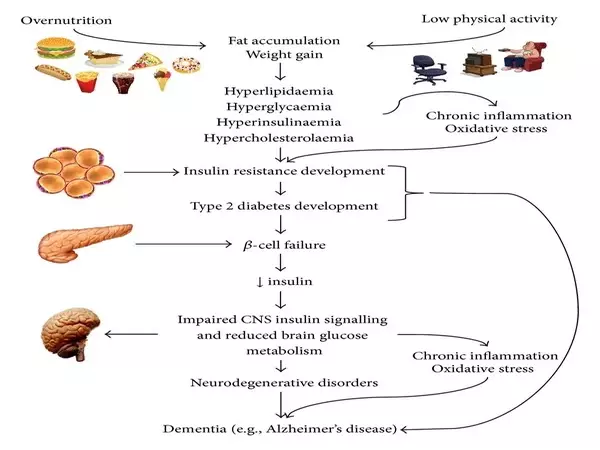Obesity has been linked to an increased risk of a variety of health disorders, including neurodegenerative diseases, and insulin resistance is one of the mechanisms postulated to link the two occurrences.
Insulin is a hormone that is essential in controlling glucose metabolism. Insulin resistance occurs when cells in the body become less sensitive to the actions of insulin, resulting in greater levels of insulin in the blood. Obesity, particularly abdominal or visceral obesity, is typically related to this illness.
Researchers at the Fred Hutchinson Cancer Research Center in the United States, lead by Mroj Alassaf, have established a relationship between obesity and neurodegenerative illnesses like Alzheimer’s disease. The study, which used the common fruit fly, found that a high-sugar diet, which is a hallmark of obesity, produces insulin resistance in the brain, which lowers the ability to eliminate neuronal debris, raising the risk of neurodegeneration. The study, which was published in the open-access journal PLOS Biology, will have an impact on medications targeted to minimize the chance of acquiring neurodegenerative illnesses.
Using fruit flies, the authors establish that high-sugar diets trigger insulin resistance in glia, disrupting their ability to clear neuronal debris. This research sheds light on how obesity-inducing diets may contribute to an increased risk of neurodegenerative illnesses.
Mroj Alassaf
Obesity is known to be a risk factor for neurodegenerative illnesses such as Alzheimer’s and Parkinson’s, but how one leads to the other is unknown. The current study sought to answer this question by exploiting similarities between humans and fruit flies.
After previously demonstrating that a high-sugar diet causes insulin resistance in flies’ peripheral organs, the researchers turned their attention to their brains. They focused on glial cells in particular because microglial dysfunction is known to promote brain degeneration. The protein PI3k levels indicate a cell’s ability to respond to insulin.

FigL: Obesity linked to neurodegeneration through insulin resistance
The researchers found that the high-sugar diet led to reduced PI3k levels in glial cells, indicating insulin resistance. They also looked at the fly equivalent of microglia, called ensheathing glia, whose primary function is to remove neural debris, such as degenerating axons. They observed that these glia had low levels of the protein Draper, indicating impaired function.
Further experiments demonstrated that artificially lowering PI3k levels resulted in insulin resistance as well as decreased Draper levels in ensheathing glia. Finally, they demonstrated that after really injuring olfactory neurons, the ensheathing glia in the high-sugar diet flies could not remove the degenerating axons since their Draper levels did not increase.
“Using fruit flies, the authors establish that high-sugar diets trigger insulin resistance in glia, disrupting their ability to clear neuronal debris,” the authors write. This research sheds light on how obesity-inducing diets may contribute to an increased risk of neurodegenerative illnesses.”
















